- Home
- Sara Shepard
The Elizas Page 5
The Elizas Read online
Page 5
“Do you need anything, dear?” Stella asked Dot as she stood and bunched her blood pressure cuff under her arm. Dot shook her head, and Stella was gone.
Dorothy chuckled after Stella left. “You’d think she would have enjoyed that. Not everyone has a doppelganger.”
To gauge Dot’s pain, one of the nurses suggested Dot grade her days, with A as perfectly healthy days and F as times where she felt close to death’s door. Dot rated a lot of her days at the hospital a C-minus, sometimes even a D. On those days, the corners of the room warped into dragons and yetis. Her scalp itched tremendously, and every time she grappled for it, a clump of hair fell out. Dot’s port, a gaping hole in her chest that fed medication straight to a vein, ached, and it became infected several times. The worst days were when she had seizures, because just before one started, she would feel the most nauseated she ever had in her life, and her vision would flip inward on itself, and she’d lose control of her limbs. She’d slip somewhere deep inside her body then—she witnessed everything, could see everything, but had no way of controlling what her body was doing. When she came out of it, her headaches were excruciating. Her skin felt like it was on fire. One time, the seizure was so violent that she almost bit through her tongue, and she had to have a giant bandage wrapped around the muscle for four days, lest she get another infection. She was so prone to infections. Bacteria adored her.
The only thing that got her through any of it was her aunt’s presence. If Dot needed Dorothy to sit by her side all night, Dorothy would. If Dot needed her to shove her finger into Dot’s mouth during a seizure so she’d bite Dorothy’s skin straight down to the bone instead of her own tongue, she would—and did, having the indentations to prove it. Every day, Dorothy came into Dot’s room with fat medical books she’d purchased from the UCLA Medical School bookstore, researching unusual brain, lymph, blood, metabolic, and autoimmune diseases that could be making Dot seize. She demanded private audiences with Dot’s doctors and had even procured Dr. Koder’s home phone number. She cornered her nurses in the hall and asked for “the real scoop” in case Dot’s doctors were mincing words. One time, Dot saw her sneak into an unattended nurses’ station and fiddle with the computer.
“What were you looking for?” Dot asked after Dorothy had scurried away just as a nurse came around the corner.
“Notes in your file, of course,” Dorothy whispered. “Just in case there’s anything I can look up. It’s possible these doctors don’t read all of the journals, you know. I’m filling in the gaps.”
She sat by Dot’s side for hours, reading her books, watching Dot’s favorite programs on TV, making up stories. They fantasized about the food Dot would eat once she was out of here and able to eat a normal diet again—the hospital was keeping her on a very restrictive food regimen, thinking perhaps that she’d developed a bizarre allergy. She pointed to a restaurant called M&F Chop House across the street.
“We’ll go there for burgers. I hear they make delicious ones.”
Dot studied the restaurant out the window. It had golden light seeping from its core. The bar was full. A TV in the corner played the news. A group at a table in the front talked animatedly.
“Maybe I’ll just live there,” Dot mused. A week before, her mother had announced she was going to marry the man she was dating, a man Dot barely knew, and who had a child Dot had never met.
“Where would you sleep?” Dorothy asked. “On a banquette?”
“No, in the room where they chop up the meat.” Dot had an unusual affinity for the smell of blood.
Dorothy chuckled. “You have quite the imagination.”
“And every night, I could dine with interesting people—fortune tellers, witches, elves.”
“Elves! Who else?”
It became a riff. Every day, they added to the tale of Dot at the Chop House. Dot would find a secret cave in the basement filled with crystals and stalagmites and gold doubloons. A dumbwaiter that led to a portal back to Gothic England, and she’d befriend Jack the Ripper. Dot of the Chop House had quite a few pets, but her favorites were her dog, Ko, and her bat, Tristan. Tristan had the power of speech, but he could only recite sonnets. Dorothy was impressed that such a little girl knew what a sonnet was.
“For I have sworn thee fair, and thought thee bright, who art as black as hell, as dark as night,” Dot recited gleefully.
“A genius!” Dorothy proclaimed.
“Your aunt’s quite the firecracker, isn’t she?” Dr. Koder said one day, popping into Dot’s room unannounced when Dorothy had taken a coffee break.
Dot looked into the doctor’s wet, Hershey-kiss-colored eyes. She had a bit of an Anna Nicole Smith thing going, with the blonde hair and the huge boobs, but her glasses softened that, rendering her wise. Ish.
“Yes,” Dot answered proudly. “Did you know she was once a model? And she got through half of medical school. In Tunisia, while she was taking a break from the CIA.”
Dr. Koder’s smile wavered a little. “Well, yes, but she’s not a doctor here.”
Dot frowned. “I know.”
Dr. Koder leaned a little closer. “If you ever need some time alone, if it ever seems like too much, just tell us.”
“If what is too much?”
“Well, sometimes family can be a little . . . suffocating. And it must be hard not being around kids your own age. You should check out our hangout area. We have a Ms. Pac-Man machine!”
Dot was confused. Maybe Dr. Koder didn’t like the Halloween decorations Dorothy had brought in: doll parts popping out of coffins, decapitated bats, rotted eyeballs in cauldrons. Maybe they didn’t like how Dorothy flirted with the male specialists. Maybe they didn’t like the time she brought that bottle of Sauvignon Blanc and drank it in Dot’s room. But it wasn’t like she’d given Dot any.
And really, if the doctors should be mad at anyone, it should be Dot’s mother. She barely showed up anymore. She just thrust all the responsibility on Dorothy while she attended office birthday parties and ate chocolate cake. Meanwhile, Dorothy helped Dot around the clock. Sometimes, Dorothy would come into Dot’s room and collapse exhaustedly in a chair, even nodding off for a few moments, jolting awake if Dot so much as coughed.
“She probably does need a rest,” Dot said. “She’s trying so hard.”
Dorothy swept in not fifteen minutes later wearing a Chanel suit and the Hermès scarf printed with prowling leopards, Dot’s favorite.
“Did you see Doctor Koder in the hall?” Dot asked. “She said you might want a rest from here. You could go back to the Magnolia. I know how much you miss their eggs Benedict.”
Dorothy paused from unraveling her scarf from her neck. “Why would she say I need a rest?”
“Well, I might have hinted that you were tired . . .”
“What else did you say about me?”
“I . . . I don’t know,” Dot said cautiously. Her aunt’s voice had grown so loud and shrill. “Nothing, really.”
Dorothy stomped around Dot’s little room. “Jesus. Those jealous assholes. One of them gets an idea in her head, and it just infects everyone else. And meanwhile, it’s you who suffers. My baby!” Then she whirled away from the window. “You don’t really agree, do you? You don’t want me gone?”
“I— Of course not.” Dot had no idea what her aunt was talking about.
Dorothy collapsed to the chair and covered her face with her hands. “Oh God. You do, you do. This is how it starts. This is how I am abandoned.”
“Aunt Dorothy,” Dot whispered. “Please. Don’t cry.”
“Everyone leaves me,” Dorothy said into her hands. “Thomas. Your mother. My mother. My husbands. Now you.”
“Don’t say that.”
Her aunt kept her head down as she stumbled out of the room. “I can’t be in here right now. I can’t look at you.”
“Wait!” Dot scrambled out of her bed, getting tangled in all the cords that fed into her body. “I’m sorry! Whatever I did, I’m sorry!”
She hobbled down the hall after Dorothy, dragging the IV pole behind her, but Dorothy was already through the exit’s double doors. A nurse found Dot in the stairwell and walked her back to her room, saying that she couldn’t leave the children’s ward. Dot flopped back onto her horrid hospital bed and flipped through the TV channels. Everything on at that time of day was either terribly violent or a talk show featuring people yelling and sobbing. She turned the TV off and stared at the ceiling, listening to the soft murmurs of the intercom in the hall. After a while, she fell asleep, her scratchy, bleached pillow wet with tears.
That evening, Dot had another seizure. All she remembered was her head flapping back against the pillow; the next thing she knew, she was strapped down to the bed, some sort of metal bite plate in her mouth. Dorothy stood over her, tears in her eyes. Dot croaked out a note of joy, but her head pounded, and she writhed in pain.
“Honey, we have to get out of this place,” Dorothy said hurriedly.
“W-what?” Dot asked blearily, her tongue thick. “Why?”
“This place is shit, that’s why. I just found an article that this place has been written up for contamination three different times in the last ten years. I bet you it’s contaminated again. I bet you that’s what’s making you sick!” She started throwing Dot’s stuffed animals into her duffel. “Let’s go. I have a car waiting. We’re going to a new place across town.”
“Now?” Dot tried to sit up.
“Yes.” Dorothy extended her arm. “Do you think you can stand?”
Dot pointed to the restraints around her. Dorothy nodded and undid them. Dot stood, but her head throbbed. She thought she might throw up. She didn’t want to leave, she wanted to lie down.
“I’m so tired,” she murmured. “Let’s go in the morning.”
“We can’t wait for the morning.” Dorothy wrapped her arm around Dot’s shoulders. “You can sleep in the car.”
“Are the doctors okay with me going?”
“I signed all the papers to discharge you. It’s our decision, not theirs. And anyway, screw them and their dirty hospital. I’m sorry I ever brought you here.”
By now they were in the hall, which was eerily empty. Dot looked out the window. It was pitch-dark outside. A wall clock in the break room said it was 3:15 a.m. She took another awkward step. The bottoms of her feet felt like pins and needles.
“I wish I could say goodbye to Doctor Koder,” Dot said. “I liked her.”
Dorothy waved her hand. “She’s not getting any answers.”
“Can I call Mom?”
“After we get to the new place,” Dorothy assured her. “After we settle in.”
Around a corner, she caught a glimpse of a swish of fabric and dark hair. Dot did a double take—here was the other Dorothy, standing frozen next to a computer console. The real Dorothy straightened her spine and gripped Dot’s arm. The other Dorothy—the nurse, Stella—stared, unblinking, for a full, long five seconds. Then, raising her chin, she turned away without a word. Dot and Dorothy scrambled down the stairwell quickly, their shoes echoing against the metal risers.
The walls of the new hospital’s children’s ward were painted a sunny yellow. Dot checked into a room and immediately fell asleep. When she awoke, her mother was standing in the hall, arguing with Dorothy.
“You had no right to move her in the middle of the night. The other place was fine.”
“Didn’t you read that article I found?”
“You should have called me about this. Instead, you just did it.”
“I did it because I had to. It was her worst seizure yet. You weren’t there. I was.”
Dot opened one eye. Her mother had turned away. Her eyes had filled with tears. You deserve that, Dot thought.
A new doctor introduced himself a half hour later. He said he would be taking care of Dot’s treatment. Dorothy beamed brightly. Dr. Osuri—young, twitchy, with too many pens stuffed in his pocket—fiddled with the stethoscope around his neck.
“It’s lovely to meet you, Dot,” he said, flipping through the medical file Dorothy had brought from St. Mother Maria’s. “We’ll get to the bottom of what’s happening to you.”
“Isn’t that wonderful?” Dorothy cried, arms clasped at her throat.
What could Dot say but yes?
ELIZA
“YOU’VE GOT TO tell the police,” I say to Desmond. I grab my phone and start to dial 911, then change my mind and look up the number for the Palm Springs PD on Google. “Right now.”
“Okay,” Desmond says, though he sounds uncertain.
I manage to punch in the digits. The phone starts to ring, and I thrust it at him. He holds it outstretched like a writhing snake.
“I’m not really versed in speaking with law enforcement,” he says. “What do you want me to say?”
I snatch it back and listen as a receptionist answers in a peppy voice that I’ve reached Palm Springs PD, and how may she direct my call? “I’m looking for Lance,” I bark.
“Lance . . . who?” the receptionist asks, all bubbles and sunshine.
As if there’s more than one Lance working at Palm Springs PD? But I don’t remember his last name. Had he even told me his last name? “Lance the forensic psychologist. Lance who visits patients in hospitals.”
“Please hold.”
They play Hall & Oates’s “Maneater” while I wait. Who chose that?
“Can you describe the person you saw?” I ask Desmond. “Was it a girl? A guy?”
“I don’t know.” He looks sheepish. “I just remember . . . a dark flash. Obsidian.”
“Why didn’t you tell the cops this when they interviewed you? They did interview you, right?”
“Well, sure, they came when the ambulance came, and they asked me what happened. But this is when I presumed you’d fallen in. I didn’t know to be on the lookout for a criminal. And they didn’t ask if I’d seen anything.”
I curl my hand into a fist. Of course the cops didn’t ask him. They’d probably already made up their minds I was drunk and suicidal.
“You have to tell them what you saw,” I urge again. I realize how I sound. I picture Desmond later tonight, having absinthe with Paul, his comic-con buddy who’d been with him poolside, talking about his crazy run-in with the paranoid almost-drowned girl. But I’m also so relieved. There was a teeny, tiny part of me that did wonder if my family was right—maybe I had jumped into that pool, just like all the other times. Maybe I was having a psychological break. Or maybe my tumor was back. Maybe I was sick again. But no: I had an assailant. So there. I practically want to sing it from the rooftops. I’m right.
A voice breaks through “Maneater.” “Hello, you’ve reached the Palm Springs PD tip line. If you have information about a crime, please leave your tip at the beep.”
My heart sinks. Then again, I suppose what I have is a tip—it’s better than nothing. After the beep, I say what I have to say, then hang up.
“Well, hopefully they’ll call. And then I’ll conference you in, if you’re available. Or at least I’ll give them your number.”
“Of course,” Desmond says. “I’ll give you my address. I’m happy to help. Very happy.”
And then he looks at me. I stand to go, but he remains seated. His eyes soften. There’s an expectant smile on his face, like he’s waiting for the real party to start. Then something hits me. It’s possible that I did something, poolside, when I woke up on the deck. I have a bad habit of having sex with strangers, despite how ridiculous I find them.
I can almost picture it. Desmond pulled me out of the pool, revived me, and I took off all my clothes in gratitude. I grabbed his crotch. Maybe we actually had sex there on the concrete before the EMTs came. And instead of being like every other guy and disappearing the moment the deed is done, Desmond actually has a conscience and has come over to see if I’m damaged and vulnerable. Or maybe he wants to have sex again. I weigh my options. He’s a weird stranger who gets assassinated for fun, but he believes i
n me. And to be honest, his interest in me is flattering. I guess I don’t have very high standards.
I take a breath and move closer to him. All at once, his greenhouse scent is appealing, and my nipples go hard. The moment my lips actually make contact with his cheek, he shoots away.
“Um,” he says, fiddling with his vest. “Hello, nurse.”
I fumble, too, jumping back so fast my calf slams against the table.
“I, um,” Desmond is making a lot of noise with his keys. “I have a . . .” He checks his watch. “Work to do. A lot of vendors to visit. So, um . . .”
“Yep, lemme walk you out.”
We get to the screen door at the same time and both reach for the handle, resulting in an awkward dance of him letting me go first, then me letting him go first, then both of us trying to stuff through the space together. We pass through my shiny kitchen, and I’m never so grateful for the pretty room in my life—it gives me credibility, sanity, even though if Desmond peeked in the pantry he’d notice an unhealthy amount of Kraft macaroni & cheese, which I eat by the truckload, even though I’m not supposed to.
We stop at the door, and I don’t know what to do with my hands. Finally I just stick out my palm for him to shake.
“Thanks for coming by! Thanks for saving me!” Because what else do you say?
The door shuts. I spin around and survey my quiet house. My living room is filled with odd antique trunks and armoires I purchased from an antiques dealer in Santa Cruz. The pale pink couch has a mysterious stain on it that might be blood—it was like that when I bought it. In the corner is a dusty RCA Theremin from the 1920s. I’ve meant to take lessons, but I’ve never gotten around to it.
All of a sudden, the hair on the back of my neck stands. Someone is watching me. I sense a flicker in the corner of my eye and whip around, certain I’m going to discover a presence there. The curtains flutter as if someone has just jumped through the open window. Or maybe it’s just the breeze.

 Heartless
Heartless Alis Pretty Little Lies
Alis Pretty Little Lies Flawless
Flawless The Elizas
The Elizas Stunning
Stunning Pretty Little Secrets
Pretty Little Secrets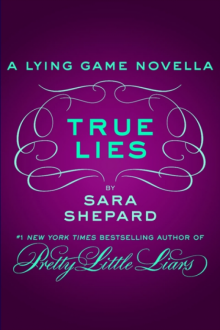 True Lies
True Lies The Good Girls
The Good Girls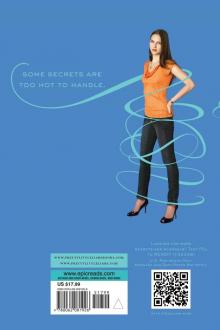 Burned
Burned Perfect
Perfect Pretty Little Liars
Pretty Little Liars Unbelievable
Unbelievable Deadly
Deadly Vicious
Vicious Crushed
Crushed The First Lie
The First Lie Cross My Heart, Hope To Die
Cross My Heart, Hope To Die The Lying Game
The Lying Game Wicked
Wicked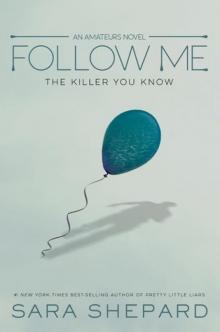 Follow Me
Follow Me Seven Minutes in Heaven
Seven Minutes in Heaven The Perfectionists
The Perfectionists Killer
Killer Twisted
Twisted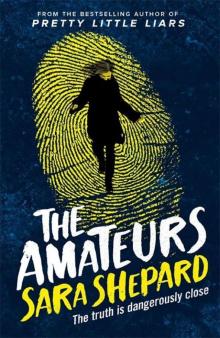 The Amateurs
The Amateurs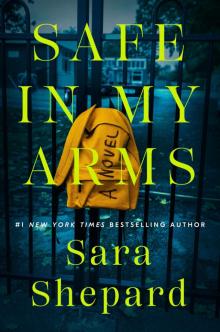 Safe in My Arms
Safe in My Arms Wanted
Wanted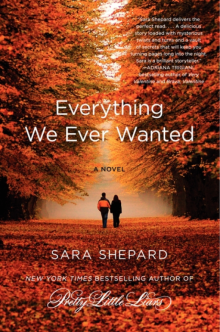 Everything We Ever Wanted
Everything We Ever Wanted Two Truths and a Lie
Two Truths and a Lie The Visibles
The Visibles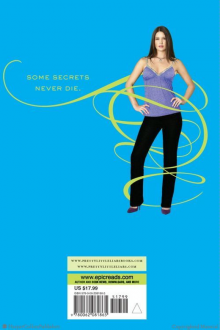 Ruthless
Ruthless Hide and Seek
Hide and Seek The Heiresses
The Heiresses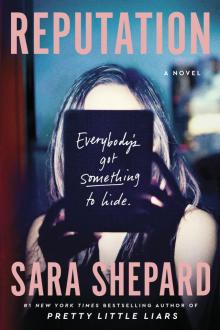 Reputation
Reputation Never Have I Ever
Never Have I Ever Toxic
Toxic Unbelievable pll-4
Unbelievable pll-4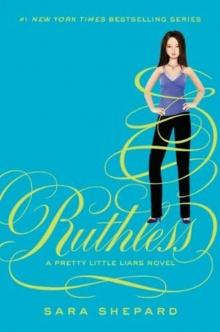 Ruthless pll-10
Ruthless pll-10 Seven Minutes in Heaven tlg-6
Seven Minutes in Heaven tlg-6 Pretty Little Liars pll-1
Pretty Little Liars pll-1 Pretty Little Liars #11: Stunning
Pretty Little Liars #11: Stunning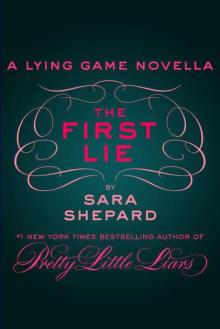 4.5 The First Lie (the lying game)
4.5 The First Lie (the lying game) The Amateurs, Book 3
The Amateurs, Book 3 Wanted pll-8
Wanted pll-8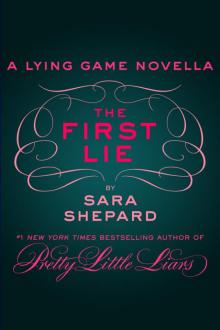 Lying Game 00: The First Lie
Lying Game 00: The First Lie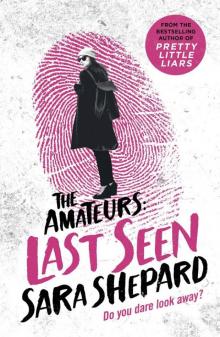 The Amateurs: Last Seen
The Amateurs: Last Seen The Lying Game #6: Seven Minutes in Heaven
The Lying Game #6: Seven Minutes in Heaven Pretty Little Liars #14
Pretty Little Liars #14 All the Things We Didn't Say
All the Things We Didn't Say Stunning pll-11
Stunning pll-11 Heartless pll-7
Heartless pll-7 The Lying Game tlg-1
The Lying Game tlg-1 The Elizas_A Novel
The Elizas_A Novel Perfect pll-3
Perfect pll-3 Burned pll-12
Burned pll-12 Twisted pll-9
Twisted pll-9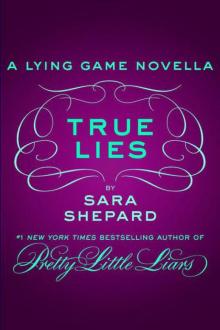 True Lies: A Lying Game Novella
True Lies: A Lying Game Novella Pretty Little Liars #9: Twisted
Pretty Little Liars #9: Twisted Two Truths and a Lie tlg-3
Two Truths and a Lie tlg-3 Crushed pll-13
Crushed pll-13 Pretty Little Liars #15: Toxic
Pretty Little Liars #15: Toxic Pretty Little Liars #12: Burned
Pretty Little Liars #12: Burned Killer pll-6
Killer pll-6 Pretty Little Liars 14: Deadly
Pretty Little Liars 14: Deadly